2021 News Archives
December 2021
GFCC GIS 2021 (December 1-2, 2021)
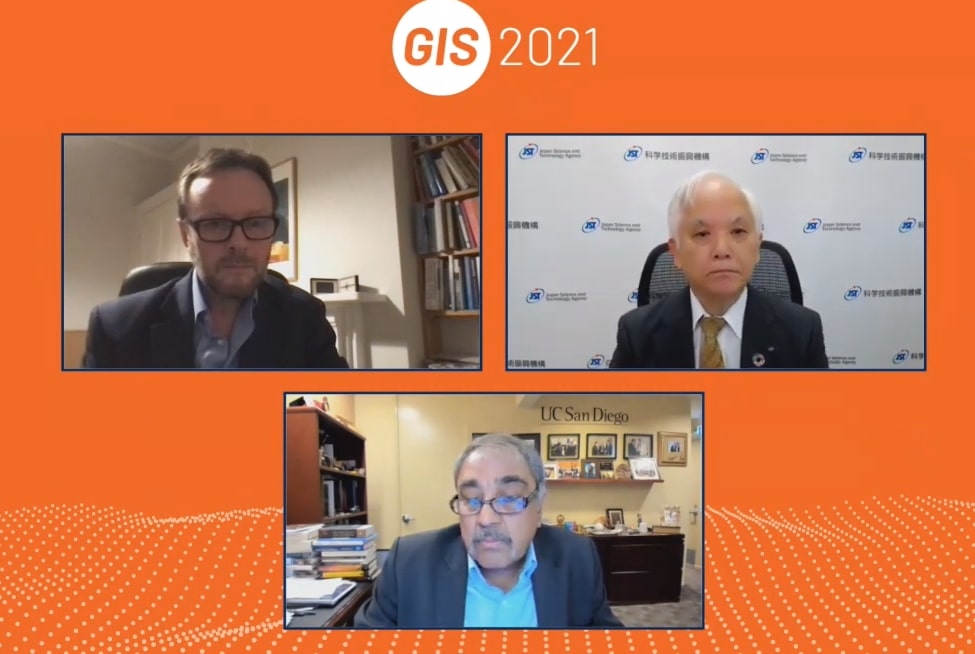
JST president Dr. Hamaguchi joined in the online leadership conversation "Future Resilient Societies" with Dr. Pradeep Khosla, Chancellor, University of California San Diego. The conversation was a part of the Global Federation of Competitiveness Councils (GFCC) Global Innovation Summit (GIS) 2021, moderated by Prof. Colin Grant, Vice Principal International, Queen Mary University of London United Kingdom.
Dr. Hamaguchi shared his thoughts about two key aspects for resilient society building: physical and mental. “Physical” refers to creating infrastructure and systems to mitigate the damage of unexpected shocks, while “mental” refers to how we can prepare our minds to deal with the emotional stress of these shocks. He also shared JST's recent activities to launch new research goals for Moonshot R&D Program related to the topic of "resilience".
November 2021
Expert Series on Resilience - Session 2 (November 17, 2021)
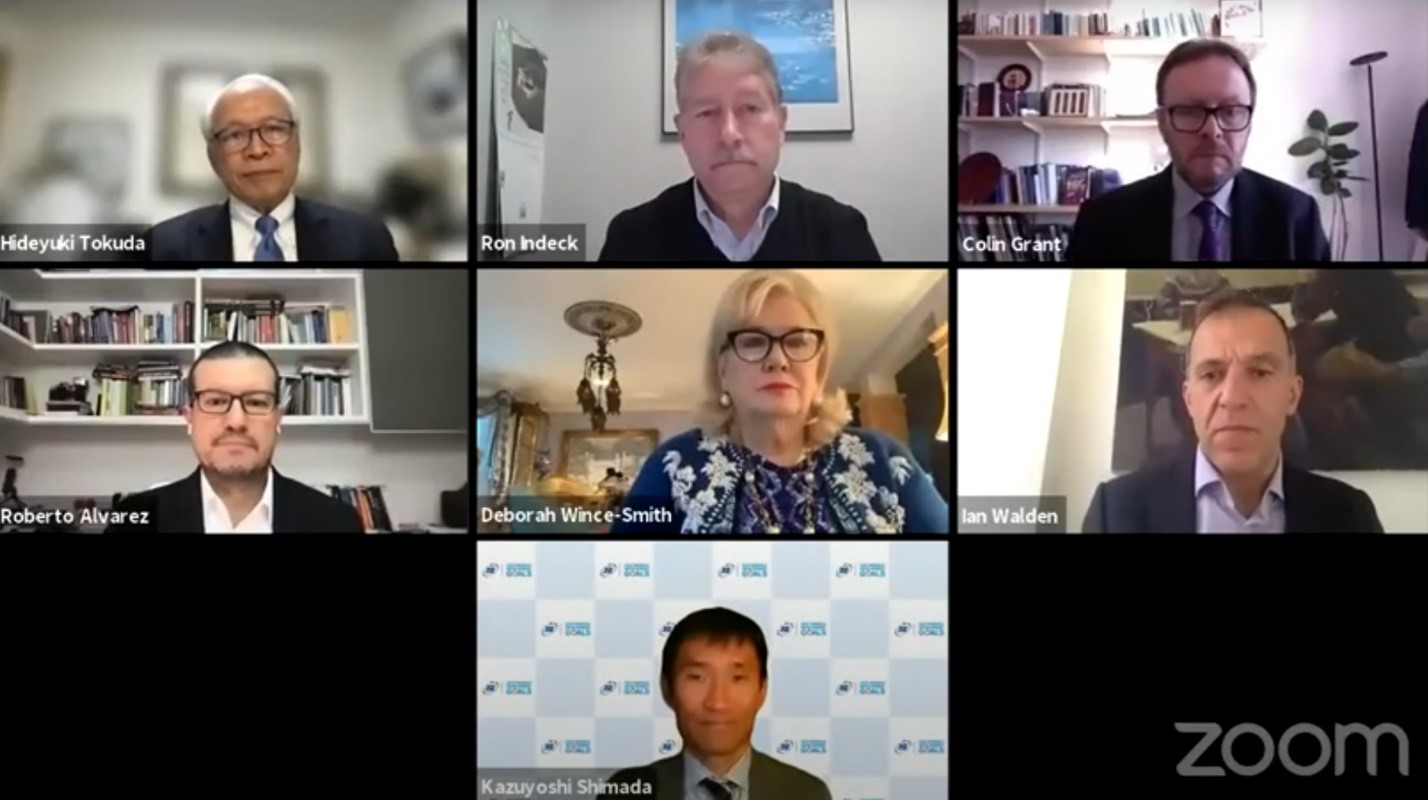
The online session titled “Importance of Cyber Security for Resilience” was co-hosted by Global Federation of Competitiveness Councils (GFCC), Queen Mary University of London (QMUL) and JST. This session is a part of an online-discussion series "Expert Series on Resilience" co-planed by JST, GFCC and QMUL.
Panelists discussed approaches that various countries have on cyber resilience, the challenges they face depending upon the level of cyber security risk and actions taken by governments to enhance cyber resilience
CSPC 2021 - Pre-Conference Panel Session (November 16-22, 2021)
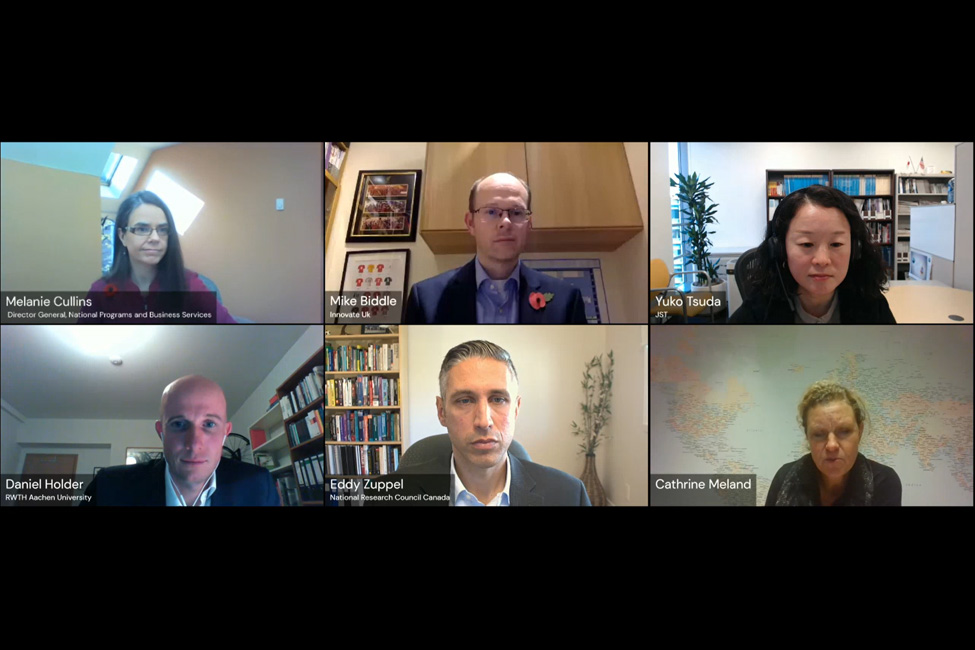
The 13th Annual Canadian Science Policy Conference (CSPC 2021) was held November 16-22 with 1,500 delegates and more than 80 plenary and concurrent conference sessions. Prior to the conference sessions, Ms. Tsuda, deputy director of JST's Washington, D.C. Office attended the Pre-Conference Panel Session "Marshalling Science, Technology and Innovation to Solve Global Problems: International Perspectives" organized by National Research Council Canada (NRC). She enjoyed discussing the speakers’ initiatives which address global issues and the frameworks for establishing international partnerships.
Frame the Future - Benchmarking (November 11, 2021)
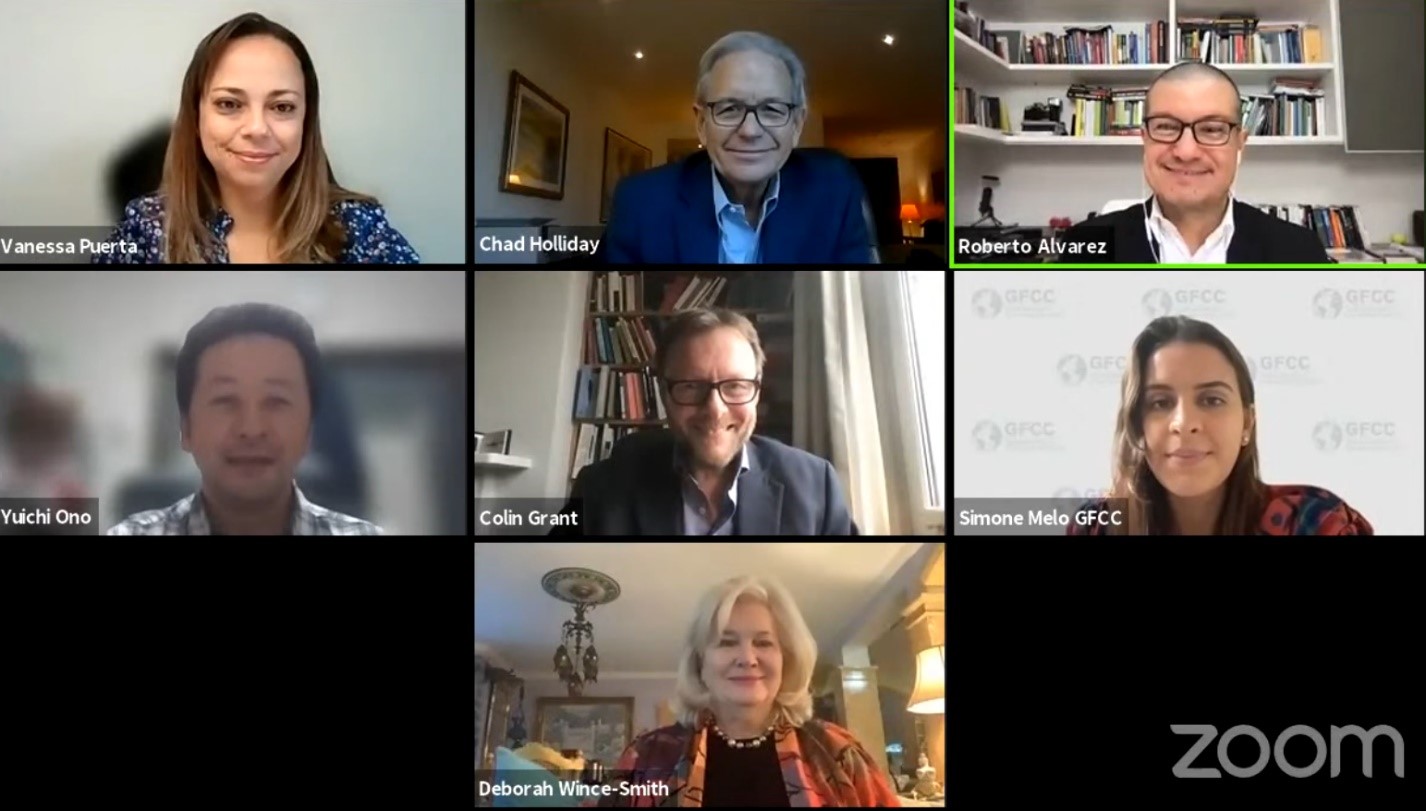
JST and Global Federation of Competitiveness Councils (GFCC) in cooperation with Queen Mary University of London (QMUL) co-hosted a joint session titled "Frame the Future – Benchmarking." This was part of a series of conversations planned under the framework of the GFCC initiative “Frame the Future: conversation series”.
Under the theme "Frame the better future responding the crises", the panelists discussed how they can better learn from past crises in order to build more innovative, sustainable, resilient, and competitive future economies and societies and how they can accelerate learning in policy and business to build a robust future. All the panelists and attendees shared the most relevant best practices, models and solutions to connect benchmarking with future competitiveness. Prof. Yuichi Ono, International Research Institute of Disaster Science, Tohoku University joined from the Japan side as a panelist.
October 2021
9th Brazilian Industry Innovation Summit (October 20, 2021)
Dr. Shimada, director of JST's Washington, D.C. Office, attended the 9th Brazilian Industry Innovation Summit in-person, hosted by the National Brazilian Confederation Industry.
He joined the Panel 2 of "Innovation that unites the world" and talked about how innovation played a role in COVID-19 countermeasures, what changes in life and the economy are here to stay. The theme of this session, "Innovation that unites the world" is about becoming more open-minded to different positions, values, and cultures, and having the ability to help each other and achieve prosperity.
Expert Series on Resilience - Session 1 (October 14, 2021)
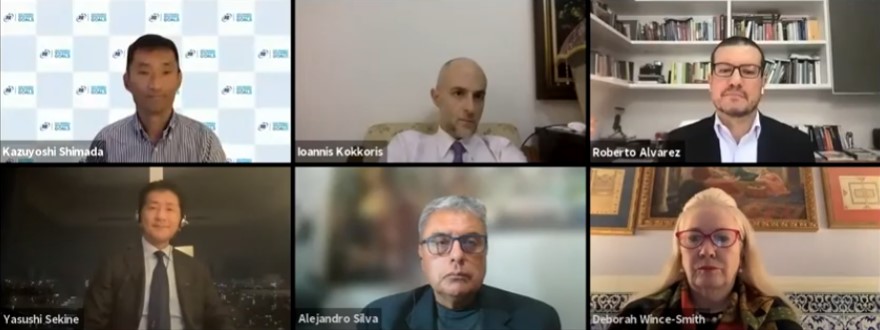
Global Federation of Competitiveness Councils (GFCC), Queen Mary University of London (QMUL) and JST co-hosted an online session titled "Relevance of Critical Infrastructure for Resilience."
Panelists discussed approaches that different countries take towards the identification and protection of critical infrastructure sectors, the challenges they face, and the sectors that they prioritize in protecting their critical infrastructure. Furthermore, lessons drawn from the different solutions needed to embed resilience into the implementation, operation and updates of such critical assets was discussed.
June 2021
Ongoing Japanese projects in the field of Quantum Science (June 1, 2021)

To facilitate good collaboration between Japanese and the US scientists in the field of Quantum Science, we are providing a list of ongoing projects in the field of Quantum Science in Japan.
We are working together with the National Science Foundation (NSF) to accelerate collaboration between our two countries. NSF is inviting requests for supplemental funding from existing quantum information science and engineering research awardees to add a new international dimension or strengthen an existing one to their award.
We hope this list will help US researchers seek potential collaboration opportunities.
May 2021
GFCC co-hosted session at Delphi Economic Forum VI (May 13, 2021)
JST president Dr. Hamaguchi joined the Delphi Economic Forum VI as a panelist of the session "The Frontiers of Technological Innovation: Re-Shaping Our World" that was co-hosted by the Global Federation of Competitiveness Councils (GFCC). He shared his vision that the new generation - the young people who will actually be alive and active by 2050 - should be involved in building the future of economies and societies. Current stakeholders must be sure they meet the needs of future stakeholders. The session was moderated by Mr. Chad Evance, Executive Vice President, Council on Competitiveness. The panelists were:
Dr. Michinari Hamaguchi, President, JST
Dr. Maher Hakim, Chief Advisor, Innovation and Enterprise, Qatar Research, Development and Innovation Council
Dr. Eric Smitt, Director, Advanced Technology Center, Lockheed Martin Corporation
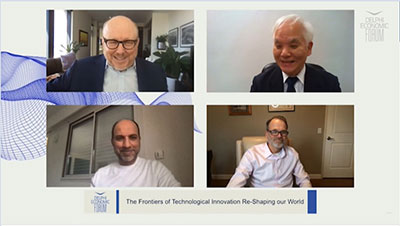
GFCC Monthly Call (May 11, 2021)
Dr. Shimada, director of JST's Washington, D.C. Office gave a presentation at a Monthly Call of the Global Federation of Competitiveness Councils (GFCC).
He shared with GFCC members the information on how JST is envisioning the future for the 6th Science, Technology and Innovation Basic Plan and beyond, mentioning a) convergent activities for achieving Moonshot goals, overcoming COVID-19 and tackling local issues, and b) inclusion & co-creation beyond business sectors, generations, and national borders.
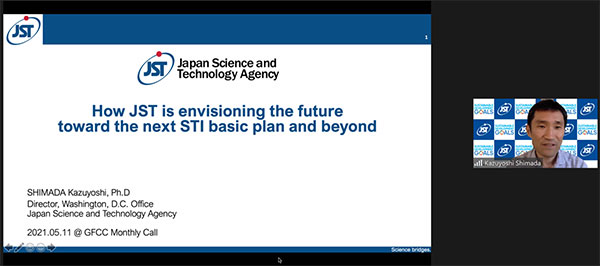
April 2021
CILAC 2021 (April 26-28, 2021)
The Latin America and the Caribbean Open Science Forum (CILAC) was held online for three consecutive days from April 26-28.
Ms. Tsuda, deputy director of JST's Washington, D.C. Office, attended the panel session "Tales of five inspiring women navigating today's life-career minefield!" and shared her story about personal/professional choices, challenges and future perspective for her career.
The panel was moderated by Dr. Lidia Brito (Mozambique), Head of UNESCO's Latin America & Caribbean Regional Office & Former Mozambiquan Minister for Science. The panelists were:
- Ms. Kristiann Allen (Canada): Associate Director, Policy & International Engagement & Head of Office, International Network for Government Science Advice (INGSA).
- Ms. Annely Allik (Estonia): Head of Science Communication, Research Council of Estonia.
- Dr. Lena Smirnova (Belarus): Director, Center for Alternatives to Animal Testing, Bloomberg School of Public Health.
- Ms. Rupini Bergstrom (South Africa): Founding Member & Communications Adviser, Hope 4 Health NGO.
- Ms. Yuko Tsuda (Japan): Deputy Director, JST's Washington, D.C. Office
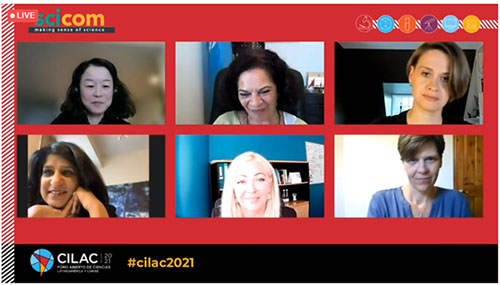
March 2021
JST-NSF Joint Workshop (March 22-25, 2021)
A workshop on thermal transport, materials informatics and quantum computing, co-sponsored by JST and NSF, was held online for four consecutive days from March 22-25. It was an opportunity to add momentum to academic conversations among the thermal transport communities and the greater materials informatics communities, helping to promote international collaboration initiatives.
Dr. Shimada, director of JST's Washington, D.C. Office, delivered opening remarks on behalf of JST to emphasize the importance of positive attitudes and passion when attempting collaboration between Japan and the US. He highlighted the MOC effective from October 7, 2018 as JST-NSF's organizational cooperative framework. Ms. Anne Emig, Cluster Lead, Office of International Science and Engineering represented NSF, and talked about the important steps necessary to strengthen JST-NSF collaborative efforts.

February 2021
JST-Stanford Symposium (February 16, 2021)
A JST-Stanford Symposium titled "Practical Innovations against COVID-19" was co-hosted by JST and Stanford University. JST president Dr. Hamaguchi opened with remarks noting the importance of JST's COVID-19 response 'Plan B'*. Chair of Stanford University School of Medicine's Anesthesia Department, Dr. Pearl, also provided a welcome message to emphasize the importance of potential collaboration between JST and Stanford University.
The symposium featured 3 keynote speakers:
- Hiroshi Amano, Professor, Nagoya University, 2014 Nobel Laureate in Physics
- Yasuhiro Tsukamoto, President, Kyoto Prefectural University
- Michael Snyder, Professor, Stanford University School of Medicine
These keynote speakers brought a variety of perspectives. Prof. Amano explained about the recent development of deep ultraviolet light-emitting diodes (DUV LEDs) and the air/water purification systems in which DUV LEDs are used to decontaminate surfaces that have come into contact with COVID-19. Dr. Tsukamoto introduced several applications of the ostrich antibody, e.g. an antiviral non-woven fabric facemask using the antibody. Prof. Snyder demonstrated how wearables data can be used for early, presymptomatic detection of COVID-19. For the following panel discussion, topics included our common challenges, ways to help each other, and win-win collaborations between Stanford and JST.
*Plan B is a multidisciplinary approach to create a society in which we can move, meet, gather and do business freely under COVID-19 conditions, alongside Plan A (trials of vaccines and drugs).
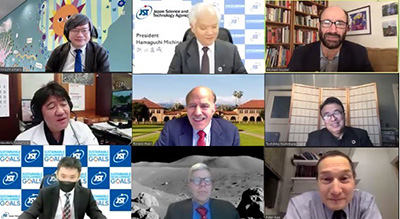
News Archives
News at JST Headquarters in Japan
